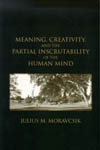

|
|
|
|

Meaning, Creativity, and the Partial Inscrutability of the Human MindThis volume criticizes current philosophy of language as having an altered focus without adjusting the needed conceptual tools. It develops a new theory of lexical meaning, a new conception of cognition--humans not as information processing creatures but as primarily explanation and understanding seeking creatures--with information processing as a secondary, derivative activity. In conclusion, based on the theories of lexical meaning and cognition, this book sketches an argument showing that the human understanding of human understanding must always remain just partial. is Professor of Philosophy at Stanford University Contents
8/14/98 ISBN (Paperback): 1575861267 (9781575861265)
Subject: Philosophy; Philosophy of Language; Philosophy of Mind |
Distributed by the
University of Chicago Press |
|
pubs @ csli.stanford.edu
|
CSLI Publications
Stanford University Cordura Hall 210 Panama Street Stanford, CA 94305-4101 (650) 723-1839 |